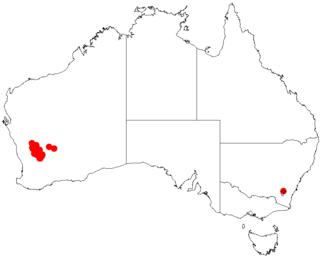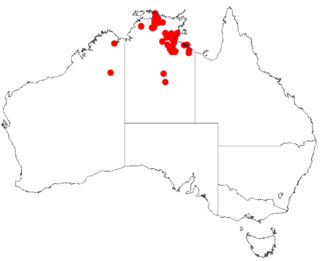
Acacia caesiella, commonly known as tableland wattle, bluebush wattle or blue bush, is a shrub or small tree that is endemic to eastern Australia.

Acacia desertorum is a shrub belonging to the genus Acacia and the subgenus Juliflorae that is endemic to western Australia.

Acacia jibberdingensis, also known as Jibberding wattle or willow-leafed wattle, is a shrub or tree belonging to the genus Acacia and the subgenus Juliflorae that is endemic to Western Australia.

Acacia sessilispica is a shrub belonging to the genus Acacia and the subgenus Juliflorae native to Western Australia.

Acacia merrickiae is a shrub belonging to the genus Acacia and the subgenus Phyllodineae that is endemic to a small area of south western Australia.

Acacia prainii, commonly known as Prain's wattle, is a shrub or tree belonging to the genus Acacia and the subgenus Phyllodineae endemic to Australia.

Acacia chrysopoda is a shrub of the genus Acacia and the subgenus Plurinerves that is endemic to an area of south western Australia.

Acacia obtecta is a shrub of the genus Acacia and the subgenus Plurinerves that is endemic to a small area in south western Australia.

Acacia veronica, commonly known as Veronica's wattle, is a shrub or tree of the genus Acacia and the subgenus Plurinerves that is endemic to a small area of south western Australia.

Acacia araneosa, commonly known as Balcanoona wattle or spidery wattle, is a shrub belonging to the genus Acacia and the subgenus Phyllodineae that is native to South Australia.

Acacia conferta, commonly known as crowded-leaf wattle, is a shrub belonging to the genus Acacia and the subgenus Phyllodineae that is endemic to eastern Australia.

Acacia cretacea, also known as chalky wattle, is a shrub belonging to the genus Acacia and the subgenus Phyllodineae that is endemic to South Australia.

Acacia hamiltoniana, commonly known as Hamilton's wattle, is a shrub belonging to the genus Acacia and the subgenus Phyllodineae that is native to parts of eastern Australia.

Acacia gracilifolia, commonly known as graceful wattle, is a shrub belonging to the genus Acacia and the subgenus Plurinerves native to a small area of central southern Australia.

Acacia semirigida, also known as stony ridge wattle, is a shrub or tree belonging to the genus Acacia and the subgenus Phyllodineae native to north eastern Australia.

Acacia kybeanensis, commonly known as kybean wattle or kybeyan wattle, is a shrub of the genus Acacia and the subgenus Phyllodineae that is endemic to south eastern Australia.

Acacia conspersa is a shrub or tree belonging to the genus Acacia and the subgenus Juliflorae that is native to northern Australia.

Acacia cretata is a shrub or tree belonging to the genus Acacia and the subgenus Juliflorae that is native to north eastern Australia.

Acacia leptostachya, commonly known as Townsville wattle or slender wattle, is a shrub or small tree belonging to the genus Acacia and the subgenus Juliflorae that is native to north eastern Australia.

Acacia barattensis, commonly known as Baratta wattle, is a shrub of the genus Acacia and the subgenus Plurinerves that is endemic to a small area in South Australia where the species is considered to be rare.




















